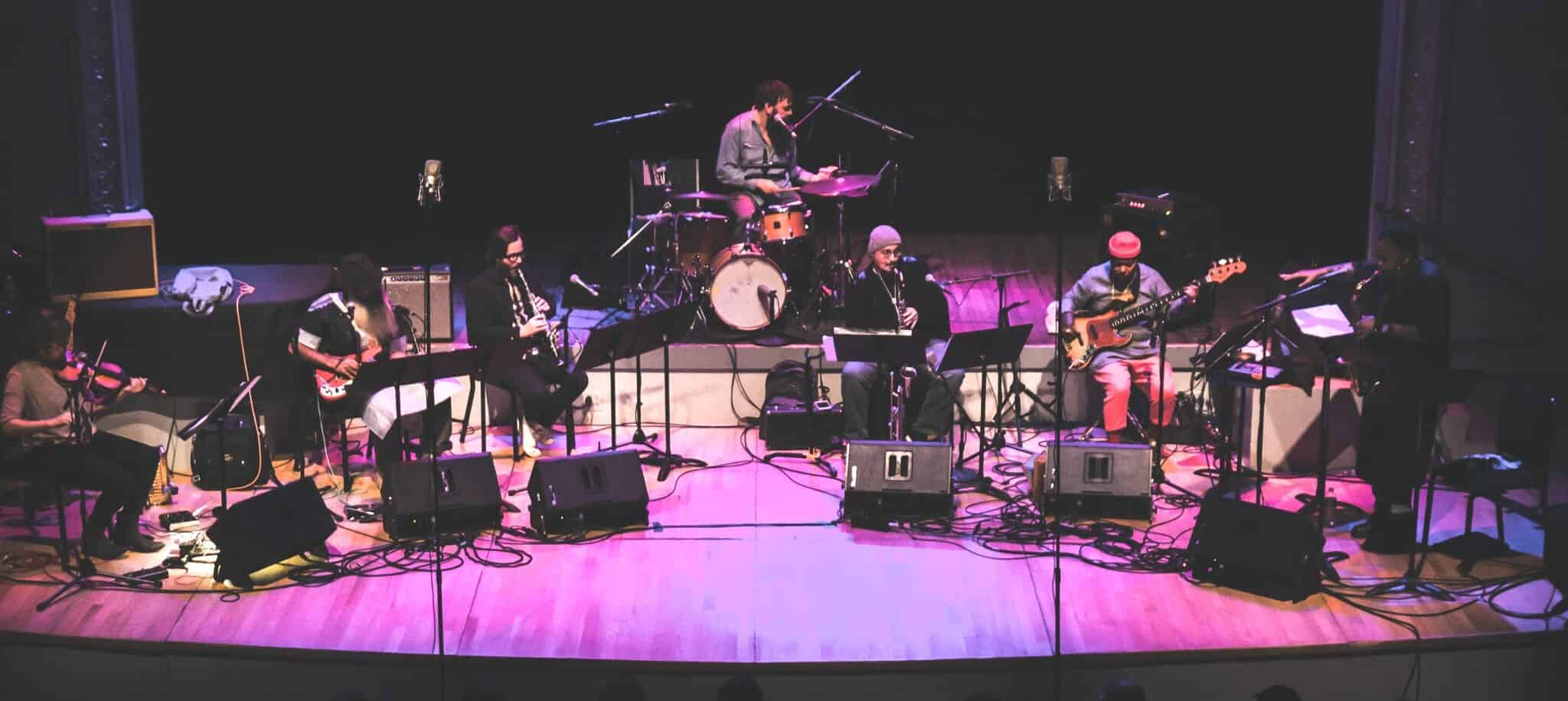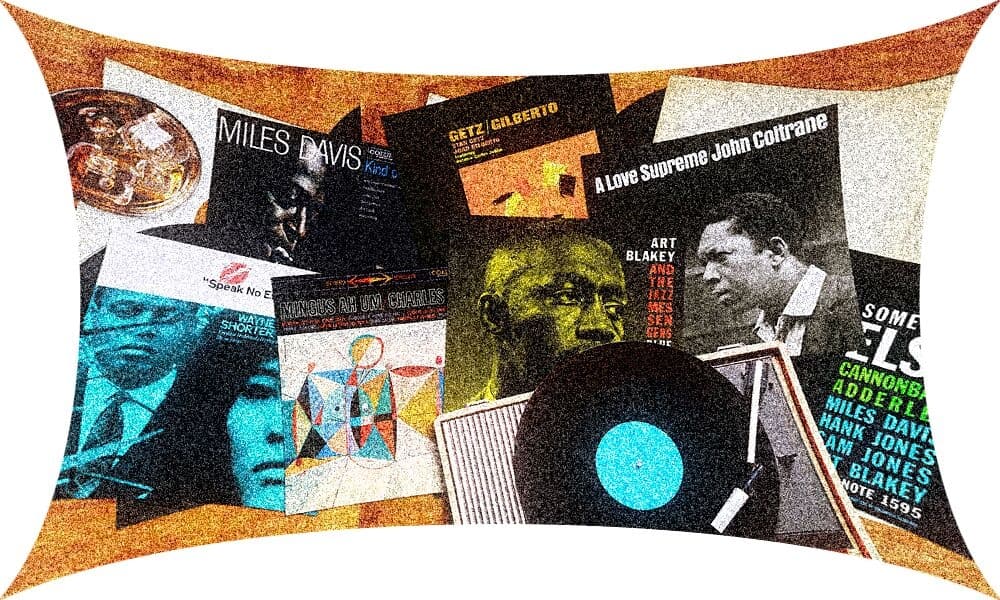Would jazz have anywhere the accumulated history if its development had not coincided with that of audio recording and reproduction technology? As an art form, it’s gloriously impure, not only stitched together at its base with musical ideas from multiple traditions but integrated into the rise of the record business from the very start – two important early jazz labels, Victor and Decca, were gramophone manufacturers that started making records so that their customers had a reason to buy one of their machines in the first place.
From the very start, jazz has had a complex and ambivalent relationship with recorded sound. Here’s a music that is built on the principal of constant (re)invention that has primarily been experienced through reproduction. No matter how many times you play Coltrane’s Giant Steps, the notes are always going to be the same, and can only be discovered once.
This in no way discounts records. They have been indispensable not only for jazz fans but musicians as well. All of us have cut our jazz baby teeth by transcribing a favorite solo off a record and playing it back on our horns again and again and again and again and… The Penguin Guides to recorded jazz is an essential book, and discographies are not only invaluable research tools but something like a Lovecraftian arcana, lists full of the runes of session and release numbers—pore over them long enough, and some new dimension will surely reveal itself.
Jazz doesn’t work like pop music, where concerts generally try to duplicate recordings as much as possible. It’s usually been the opposite, with musicians trying to recreate the gig idea on wax, like on Charles Mingus Presents Charles Mingus, or the way Miles Davis approached the Prestige sessions with his first Quintet, treating each album like a set at a club. Miles was also responsible for the most notable instances where jazz was recorded as studio composition in a way that deliberately could not been done live, with first In a Silent Way and especially with Bitches Brew, an album that remains an endless, fascinating mystery, set outside of the stream of time because it was made outside of real time.
Which brings this to Matana Roberts, who is doing something that is meant as a document in that it is a sound recording, but is also absolutely a document, an official record of information. This is her COIN COIN series of albums (the most recent, COIN COIN Chapter Four: Memphis, is out as of this fall on Constellation) that use jazz, from blues to free, as the foundation to explore the meanings, paradoxes, tragedies and hopes of African-American life. Roberts weaves stories through the music, via song, spoken word, non-musical sounds; she calls it “panoramic sound quilting” and it is personal, mystical, earthy, and universal.
And it works both on record and live. Based on the two chapters I’ve experienced in person – the most recent was her sole NYC performance of Chapter Four at Roulette in November – it may work better on record than live. The spirit and meaning of her music-making is beautiful, and that makes the sound of it beautiful, but it’s also mood music – it is personal and uncanny, a world apart from the world, and it takes the right mood to step inside it. The advantage of home listening is that one can reach for COIN COIN when the mind is right.
The Roulette performance was lovely, slightly subdued, full of warmth. There was a large crowd and their devotion to Roberts was clear, but not everyone seemed to be in the right frame of mind to leave their world behind, carving some distance in an event that should collapse that distance. Roberts made everything available, having the audience sing along with a repeated series of perfect fifths, and at one point a whole verse. This made a peaceful, intimate connection between everybody in the hall, but Roberts also dissipated that at key moments by moving on to something else, part of a hazy formlessness that, bound to the length of a CD and divided up into tracks, isn’t an issue on record but made for some ups and downs and ins and outs at Roulette.
Still, her whole series is a quilt of large-scale parts, with a scope and ambition greater than anything Wagner imagined. It is one of the most involving things going on in jazz right now and is only fairly judged all together.
Best of 2019
With the end of the year, it’s time for more records, on lists: the bests! I vote in the NPR and DownBeat polls, both of which divide up the music into categories, but what I think matters is solely what’s new and what’s renewed; new releases and things that have been discovered or brought out of the past. The past isn’t even past, the man said, which can be a problem in jazz when newly made music sounds like it was made decades ago, so I keep the living among the living and leave the past to the dead. These are my top ten favorite new releases from last fall through this November, in no ranked order:
Zach Brock/Matt Ulery/Jon Deitemeyer, Wonderment (Woolgathering Records)
Greg Ward Present Rogue Parade, Stomping Off From Greenwood (Greenleaf)
Anat Fort Trio, Colour (Sunnyside)
Avram Fefer Quartet, /Testament/ (Clean Feed)
Kassa Overall, Go Get Ice Cream and Listen to Jazz
Damon Locks Black Monument Ensemble, Where Future Unfolds (International Anthem)
Miho Hazama, Dancer in Nowhere (Sunnyside)
Chano Dominguez/Hadar Noiberg, Paramus (Sunnyside)
Go: Organic Orchestra & Brooklyn Raga Massive, Ragmalas – A Garland Of Ragas (Meta)
Don Byron, Aruán Ortiz, Random Dances and (A)tonalities (Intakt)
James Brandon Lewis, An Unruly Manifesto (Relative Pitch)
Yeah, that’s eleven. The music is sealed on disc, but how it feels changes in relationship to…everything. That’s jazz.
The reissue scene is often clouded by labels perpetually mining their back catalogue for yet more cash, but there were some exceptional releases this year, starting with the discovery of an amazing extended live recording from Mingus, and filled out with great sets from Resonance Records:
Charles Mingus, Jazz in Detroit/Strata Concert Gallery/46 Selden (BBE)
Eric Dolphy, Musical Prophet: The Expanded 1963 New York Studio Sessions (Resonance)
Nat ‘King’ Cole, Hittin’ The Ramp: The Early Years (1936-1943) (Resonance)
Betty Carter, The Music Never Stops (Blue Engine)
Mal Waldron Trio, Free at Last (Extended Edition) (ECM)
Johnny Griffin/Eddie ‘Lockjaw’ Davis Quintet, Ow! Live at the Penthouse (Reel to Real)
Treat your friends, neighbors, and yourself during the giving season. And do mark your calendars for the 2020 Winter Jazzfest, January 9 to 18. This is the premiere jazz event in NYC and includes the weekend marathons where you can wander from one venue to another and hear incredible music, just like the old days www.winterjazzfest.com.
Best for the holidays and the new year, and good listening to all.











